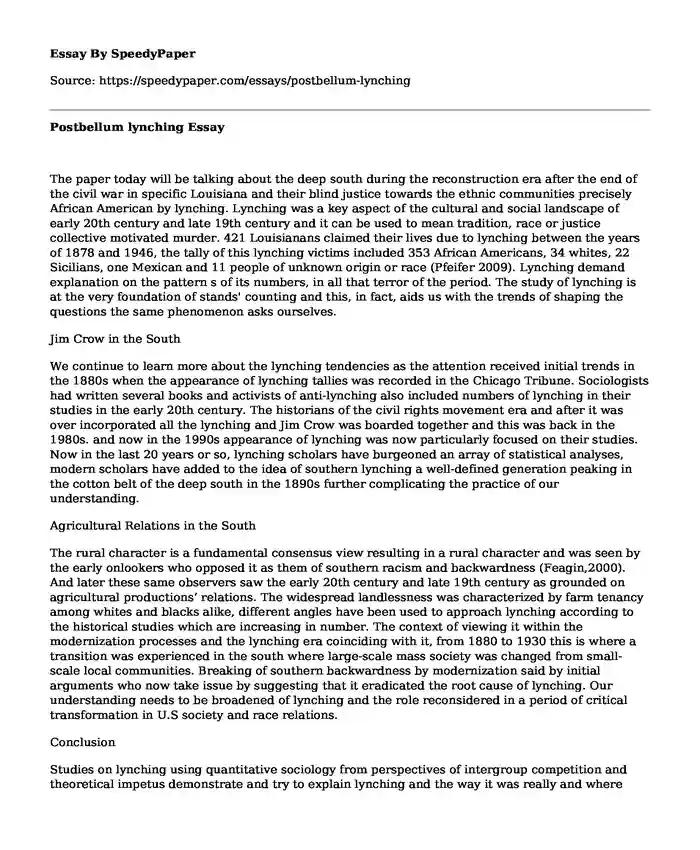
| Type of paper: | Essay |
| Categories: | Psychology Economics Career |
| Pages: | 3 |
| Wordcount: | 615 words |
The paper today will be talking about the deep south during the reconstruction era after the end of the civil war in specific Louisiana and their blind justice towards the ethnic communities precisely African American by lynching. Lynching was a key aspect of the cultural and social landscape of early 20th century and late 19th century and it can be used to mean tradition, race or justice collective motivated murder. 421 Louisianans claimed their lives due to lynching between the years of 1878 and 1946, the tally of this lynching victims included 353 African Americans, 34 whites, 22 Sicilians, one Mexican and 11 people of unknown origin or race (Pfeifer 2009). Lynching demand explanation on the pattern s of its numbers, in all that terror of the period. The study of lynching is at the very foundation of stands' counting and this, in fact, aids us with the trends of shaping the questions the same phenomenon asks ourselves.
Jim Crow in the South
We continue to learn more about the lynching tendencies as the attention received initial trends in the 1880s when the appearance of lynching tallies was recorded in the Chicago Tribune. Sociologists had written several books and activists of anti-lynching also included numbers of lynching in their studies in the early 20th century. The historians of the civil rights movement era and after it was over incorporated all the lynching and Jim Crow was boarded together and this was back in the 1980s. and now in the 1990s appearance of lynching was now particularly focused on their studies. Now in the last 20 years or so, lynching scholars have burgeoned an array of statistical analyses, modern scholars have added to the idea of southern lynching a well-defined generation peaking in the cotton belt of the deep south in the 1890s further complicating the practice of our understanding.
Agricultural Relations in the South
The rural character is a fundamental consensus view resulting in a rural character and was seen by the early onlookers who opposed it as them of southern racism and backwardness (Feagin,2000). And later these same observers saw the early 20th century and late 19th century as grounded on agricultural productions' relations. The widespread landlessness was characterized by farm tenancy among whites and blacks alike, different angles have been used to approach lynching according to the historical studies which are increasing in number. The context of viewing it within the modernization processes and the lynching era coinciding with it, from 1880 to 1930 this is where a transition was experienced in the south where large-scale mass society was changed from small-scale local communities. Breaking of southern backwardness by modernization said by initial arguments who now take issue by suggesting that it eradicated the root cause of lynching. Our understanding needs to be broadened of lynching and the role reconsidered in a period of critical transformation in U.S society and race relations.
Conclusion
Studies on lynching using quantitative sociology from perspectives of intergroup competition and theoretical impetus demonstrate and try to explain lynching and the way it was really and where blacks were it was more common when they threatened interests of whites' agriculture economy (Smangs,2016). This furthered whites' interests across classes, on one hand, the large black labor force being controlled and serving the white landlords, on the other hand reducing competition for land from the blacks from the landless and smallholder serving whites in the labor opportunities, farm tenant and land in the agricultural economy of the south.
References
Pfeifer, M. J. (2009). The Origins of Postbellum Lynching: Collective Violence in Reconstruction Louisiana. Louisiana History: The Journal of the Louisiana Historical Association, 50(2), 189-201.
Smangs, M. (2016). Modernization and lynching in the New South. Sociological Science, 3, 825-848.
Feagin, J. R., & Hernan, V. (2000). White racism: The basics. Routledge.
Cite this page
Postbellum lynching. (2023, Jan 02). Retrieved from https://speedypaper.com/essays/postbellum-lynching
Request Removal
If you are the original author of this essay and no longer wish to have it published on the SpeedyPaper website, please click below to request its removal:
- Argument Essay Example on Children Need to Play, Not Compete by Jessica Statsky
- Art Essay Example: The Card Player by Paul Cezanne (Painting)
- Free Essay: Enrollment for Political Science as My Independent Study
- Free Essay on the Change Leadership Discussion
- A Personal Statement Essay Example For a Nursing Program Application
- Paper Example: What Enhances Learning
- Essay Example. Becoming Mexican American by George Sanchez
Popular categories




